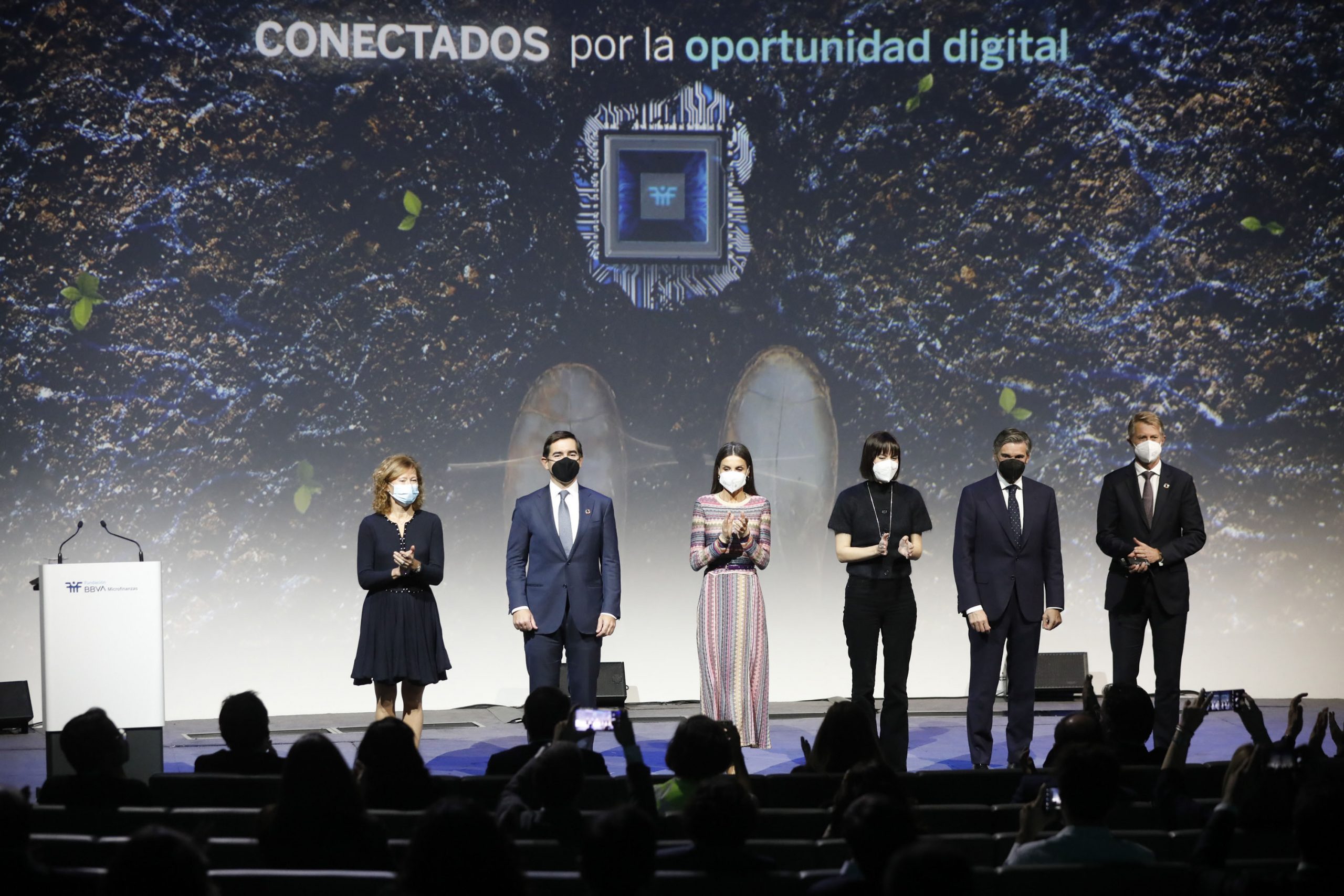The BBVA Microfinance Foundation (BBVAMF) has celebrated ‘Conectados por la oportunidad digital’, to highlight the importance of driving a more innovative and inclusive economy through technology which leaves no one behind.
This event, headed by H.M the Queen, also welcomed the participation of BBVA Group Executive Chairman, Carlos Torres Vila; Deputy Governor for Banco de España, Margarita Delgado; BBVA Microfinance Foundation CEO, Javier M. Flores, as well as leaders of prominent development organizations and technological companies like GSMA, OneWeb and the Bill & Melinda Gates Foundation. Science and Innovation Minister Diana Morant was also present.
During Her Majesty’s opening remarks, the Queen insisted upon the need to connect everyone, since the digital divide “draws a very fine line between having access or not to many resources, such as services or education”. She also pointed out that ending this inequality is “a human rights issue, as the United Nations acknowledges, and mirrors the actions promoted by the BBVA Microfinance Foundation”.

H.M. the Queen during the “Conectados por la oportunidad digital” event, hosted by the BBVA Microfinance Foundation. EFE/David Fernández
BBVA’s chairman shared that: “Banks have a responsibility to society; we must generate a positive impact on people’s lives. That is why we work for the inclusive development of all, leaving no one behind.” During his panel participation, Carlos Torres Vila highlighted the work of the BBVA Microfinance Foundation (BBVAMF) which “supports millions of people with limited resources in Latin America in order to boost the productivity of their small businesses through business training and digital skills, as well as financial education in order to promote social and economic growth that is truly inclusive.”
Harnessing the digital opportunity to leave no one behind
“Even though 94% of the population live in areas with signal, 43% still have no access to the internet. The challenge today is to close this digital usage gap, which is seven times higher than the signal availability gap”, confirmed GSMA’s director general, Mats Granryd. According to him, “the lack of literacy and digital skills, as well as affordability, continue to be key barriers to mobile internet adoption.”
Precisely these obstacles are the ones that inhibit the digitization of the 2.7 plus million people accompanied by the BBVAMF in five countries in Latin America (Colombia, Peru, Dominican Republic, Chile and Panama). BBVAMF CEO, Javier M. Flores, shared the steps taken forward, despite these barriers, “We have developed technological solutions to bring financial services and training closer to our entrepreneurs so they, as well as their families, can take advantage of the digital era.”
During the event, it was also announced that the Foundation has implemented a pilot project in Colombia and Peru that seeks to expand internet access to remote areas through satellite connectivity. “This initiative is already having an impact on over 2,000 people. It is allowing us to improve the service we offer them and make it more convenient for them. They can access the information they need and quality training in the same conditions as in more populated areas,“, said Javier M. Flores.
Greta Bull, given her considerable track record on the field of development finance in the World Bank, and as recently appointed director for Women’s Economic Empowerment at the Bill & Melinda Gates Foundation, reminded everyone that “technology is part of the solution, but it’s only a tool” and that “real change requires a very solid understanding of the development context in which one is operating.”
The challenge of connecting those who are currently excluded in this process is for the interest of all, especially for technological disruptors who see it as an opportunity for business, as well as part of their social responsibility. OneWeb director general Neil Masterson talked about how they hope to reduce the internet access gap, “We partner with local telcos to maximize our impact, since they have the expertise on the ground and know the realities of the business and the communities we need to reach.” According to Neil, partnerships allow OneWeb to scale its business model and offer more competitive prices, adapted to the purchasing power of vulnerable populations. Regarding the future of satellite connectivity, Masterson pointed out that “there is a digital divide in every country and satellite communications offers a way to reach those unconnected at scale.”
Deputy Governor for the Banco de España, Margarita Delgado, assured that, “We cannot forget the risks that digitization and new products like crypto assets entail.” Additionally, she reflected on the role of digitization in the growth and recovery of society from the pandemic, “COVID-19 has accelerated a global trend that was inevitable and on which company survival depends.”
Blanca Jumanga and Daicy Ochavano, two female entrepreneurs accompanied by BBVAMF in Peru, are beneficiaries of the aforementioned pilot project. Connectivity has allowed them to open banking correspondents thanks to a satellite antenna in their area. Both agreed on the time and money saved from not having to travel long distances to the nearest office, aside from the security they feel upon not bringing cash with them. “The internet has made communication easier with other people, and managing our businesses as well, like receiving orders”, they shared.
These testimonies have echoed the challenge of the digital gap during an event that sought to bring two realities closer. Two realities that need one another to achieve sustainable and inclusive development. This was what Eugenio Maestre, the banking correspondent of BBVAMF in Colombia said during his welcoming remarks, “Thanks to the technological advances, we are accessing services that help us improve our lives, the lives of our children and that of our neighbors. All that will be discussed during this event will be felt here, on the other side of the world.”

(L-R) H.M. the Queen with the deputy governor for Banco de España, Margarita Delgado; BBVA Group chairman, Carlos Torres Vila; the Minister for Science and Innovation, Diana Morant; BBVAMF CEO, Javier M. Flores and GSMA director general, Mats Granryd

